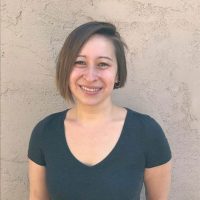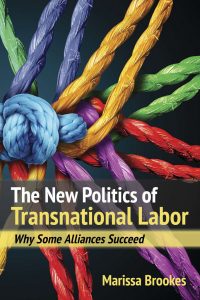Marissa Brookes
Mellon Humanities Fellow
 Department: Political Science
Department: Political Science
Rank: Assistant Professor
# of years at UCR: I am in my 7th year now.
Top three texts I would take to a desert island: Karl Polanyi’s The Great Transformation; Theda Skocpol’s States and Social Revolutions;
Howard Zinn’s A People’s History of the United States
Currently listening to: Dillinger Four, Naked Raygun, Danny Brown, Malibu Ken
A favorite record I encourage students to listen to is: Propagandhi’s 1993 How to Clean Everything. It’s a political punk classic.
Website: researchgate.net/profile/Marissa_Brookes
Q: Your research agenda summed up in one sentence:
I study the politics of labor in the global economy, including how workers’ transnational activism influences employers to create and maintain “good jobs” (secure, stable, and gainful employment) in both advanced and developing countries.
Q: What contribution do you see your work making to research in this area?
Broadly speaking, the essential contribution of my research is in showing how globalization creates unique forms of power for workers, which they exercise in attempt to compel corporations to improve working conditions and protect labor rights.
Q: What questions are you currently exploring?
My current project, “Bringing Labor Back In: How Histories of Conflict Tame Corporate Power Over Time,” investigates labor transnationalism’s long-term impact on employment relations through a comparative historical analysis of global unions’ evolving relationships with transnational corporations over three decades.

Cover of Marissa’s book: “The New Politics of Transnational Labor.”
Q. You have had a busy year! What have you been up to?
Recently, I published my first book (The New Politics of Transnational Labor, 2019, Cornell University Press), presented a new paper on labor in China at UC San Diego as part of a multi-campus project on Great Power Competition in the 21st Century, and traveled to Mexico City for the Southwest Workshop on Mixed-Methods Research, an annual conference I co-founded and co-organize.
Q. When friends and family ask you what you love about your work….
Q. What have you learned from teaching students at UCR?
The most valuable lesson teaching has taught me is that students excel when they feel genuinely connected to their course material, their classmates, and their professors. They have to feel connected. They have to care. And they have to know that I care too. Only then do students develop the level of deep interest and active engagement necessary for systematic analysis and the development of critical thinking skills.
Q. If you had the power to change the academy in some way, what would you do?
If I could change one thing about the academy, it would be to eliminate the economic barriers that prevent bright, hardworking individuals from reaching their full potentials.
Q. What might people be surprised to know about the inspiration for your research?
My work is inspired by the difficult, exhausting jobs my family members have had to work over the years and the opportunities I have had for socioeconomic mobility. My mother immigrated to the US from the Philippines during the Marcos regime and never got to finish her degree. My father is a Vietnam veteran who was not encouraged to pursue a college education by his factory-worker father and extended family of coal miners. I feel fortunate and enormously privileged to be able to study the politics of work and employment as a professor at UCR.
In Focus is a new interview series that features faculty associates of the Center for Ideas and Society.
